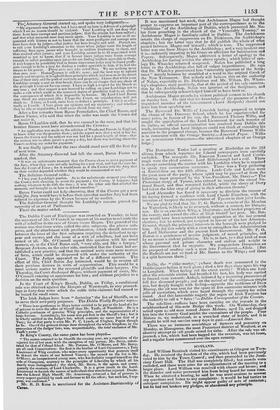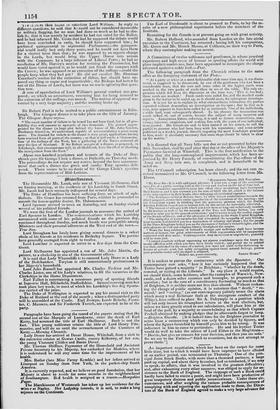SCOTLAND.
Lord William Bentinck visited his constituents at Glasgow on Tues- day. He received the freedom of the city, which had been previously voted to him by the Town- Couneil ; and then proceeded to the Justi- ciary Court Hall. The Hall was completely filled ; but crowds were excluded, and there were cries for an adjournment of the meeting to a larger place. Lord William was received with cheers and hisses ; and the disorder and noise prevented him from being beard for some time. When he obtained a hearing, he said he was most anxious to answer any questions and listens to any complaints : it would be bad tactics to anticipate complaints. He might appear guilty of acts of omission ; but he had not broken any pledges, or abandoned any principle. e curs then tiepin to catechize Lord William. In reply to different questions, be said that Ir! could not be considered favourable to military, flogging, for no man bad done so much as be bad to abo- lish it ; that it was merely by accident he had not voted for the Ballot, and be had informed Mr. Grote that had he supposed the debate would have been concluded so early, be should have supported him ; he preferred quinquennial to septennial Parliaments—the quinquen- nial would really last only three years, and he would not have them for a shorter term than that ; he was opposed to an organic change in the Lords, but would bring the Upper House into unison with the Commons by a large infusion of Liberal Peers ; he had no recollection of Mr. Harvey's motion for revising the Pension.list, but would have voted against it, as he would not break the compact with the Crown ; he was opposed to an extension of the suffrage—could the people keep what they had got ? He did not recollect Mr. Sharman Crawford's motion for the extinction of tithes, but should have op- posed any thing so vague and impracticable ; the Bishops had betttr be out of the House of Lords, but there was no use in agitating that ques- tion now.
A vote of approbation of Lord William's general conduct was pro- posed ; on which au amendment, censuring him for being inimical to the extension of the suffrage, was moved. The motion of approval was carried by a very large majority ; and the meeting broke up.



























 Previous page
Previous page